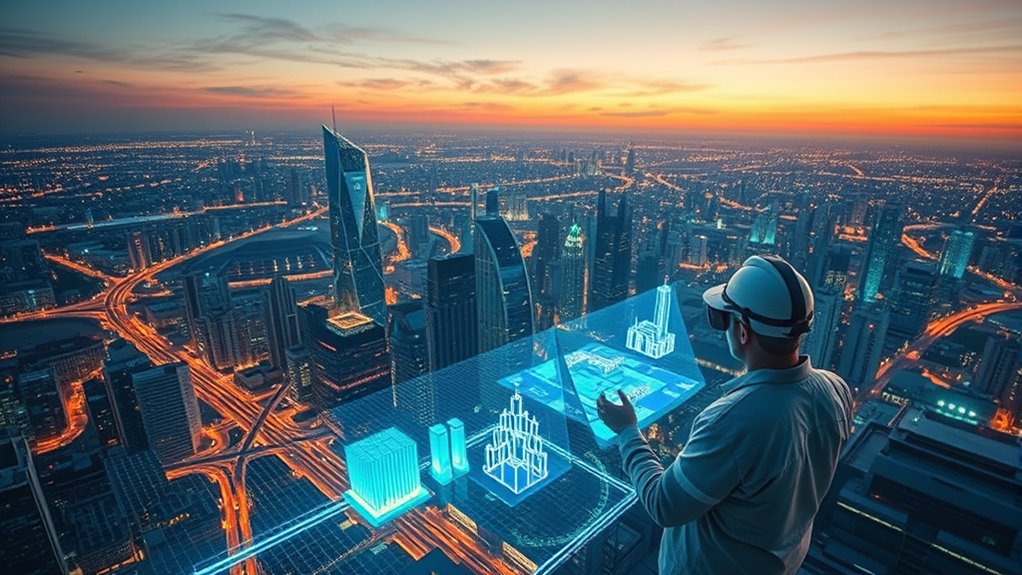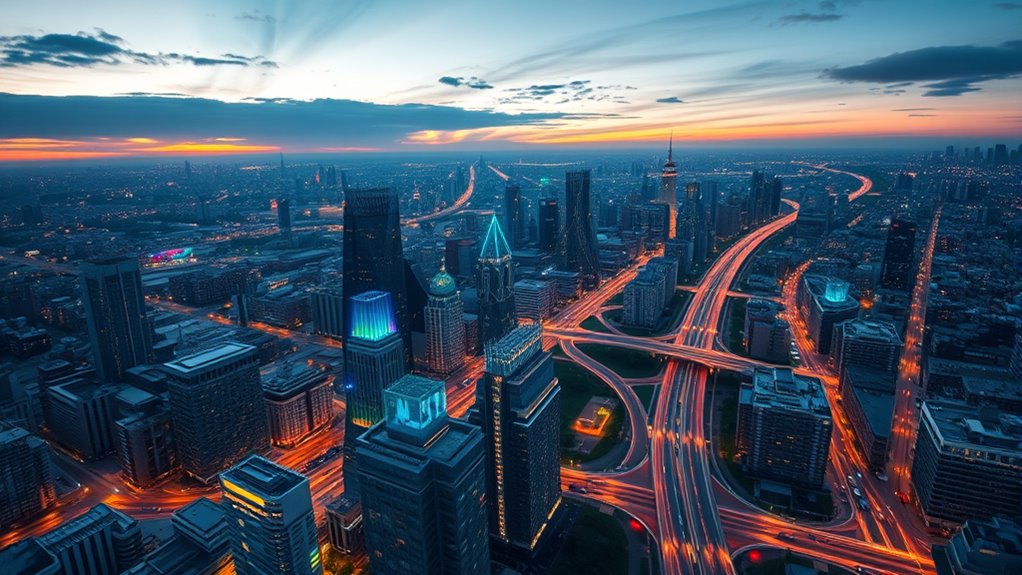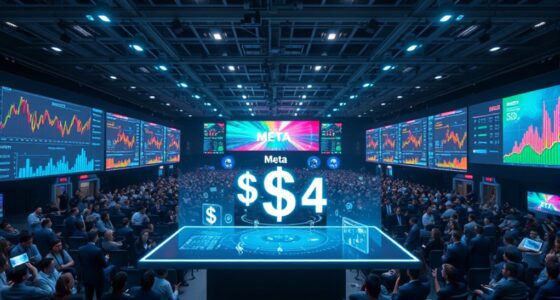AI is revolutionizing urban planning by enabling smarter, more sustainable cities through advanced data analysis and real-time decision-making. It helps you optimize transportation, manage resources efficiently, and create adaptable designs that respond to residents’ needs. AI also supports digital twin technology and IoT integration, making city operations more resilient. As AI continues to evolve, it opens new opportunities for innovative solutions—stay with us to explore how these advancements are shaping future urban landscapes.
Key Takeaways
- AI enhances data analysis and predictive modeling to inform smarter urban development decisions.
- Real-time insights from AI-driven systems optimize transportation, traffic management, and infrastructure planning.
- Digital twin technology allows virtual simulation of urban environments for testing and refining city designs.
- AI-integrated IoT and smart grids provide continuous data feeds for adaptive city management.
- AI supports sustainable urban growth by improving resource efficiency, energy use, and environmental monitoring.

AI is transforming urban planning by enabling smarter, more sustainable cities. The market for AI in this field is experiencing rapid growth, with an expected compound annual growth rate (CAGR) of over 20% through 2029. By then, it’s projected to reach approximately $51.45 billion, a significant jump from around $20.58 billion in 2024. This expansion reflects growing demand for innovative solutions that make urban development more efficient and environmentally friendly. As cities face increasing pressure from population growth and environmental challenges, AI offers tools to address these issues effectively. The global market for AI in sustainable urban planning is also anticipated to surpass $54.8 billion by 2030, underscoring its crucial role in shaping future urban landscapes.
AI is revolutionizing urban planning with rapid growth and innovative solutions for smarter, sustainable cities.
Your role as an urban planner or decision-maker becomes increasingly empowered by AI applications. These range from transforming data analysis and predictive modeling to refining infrastructure and transportation planning. AI’s capacity to analyze vast amounts of data helps you identify patterns—whether it’s tracking population growth, managing traffic congestion, or predicting future urban needs. This insight enables you to make informed decisions quickly and accurately. For example, AI-driven traffic management systems analyze real-time traffic flow and suggest ideal routes, easing congestion and reducing commute times. In infrastructure planning, AI ensures resources are used efficiently, minimizing waste and lowering costs. By integrating these tools, cities become more adaptable, resilient, and responsive to residents’ needs.
The benefits of AI extend beyond efficiency. It automates routine tasks, freeing your team to focus on strategic planning and innovation. AI also plays a key role in energy management, analyzing data from various sources to optimize production and consumption, which supports sustainability goals. Importantly, AI’s data-driven approach can help reduce social inequalities by guiding the development of affordable housing and improving access to essential services such as healthcare, food markets, and transportation. This technology fosters the creation of smarter, more inclusive urban environments that balance social, economic, and environmental priorities. Additionally, advancements in sensor technology and data collection methods enhance AI’s capabilities in urban planning.
Addressing challenges like urban sprawl and resource depletion, AI supports better land-use planning and resource management. It enhances waste collection, security, and environmental monitoring, making cities safer and cleaner. Emerging innovations like digital twin technology allow you to simulate urban environments, testing new designs virtually before implementation. AI’s integration with IoT devices and smart grids provides real-time data feeds, enabling you to respond swiftly to changing conditions and optimize city operations continuously. As AI continues to evolve, it empowers you to develop cities that are not only smarter but also more sustainable, resilient, and livable for generations to come.
Frequently Asked Questions
How Does AI Improve Community Engagement in Urban Planning?
You can see how AI improves community engagement by making communication more accessible and interactive. AI-powered tools like chatbots answer questions instantly, while VR and AR help you visualize projects before they happen. Data visualization clarifies complex info, and multilingual support guarantees everyone’s voice is heard. These innovations foster transparency, trust, and active participation, so your community stays informed and involved in shaping urban development.
What Are the Privacy Concerns With AI Data Collection?
Your privacy is under attack in ways as vast as the universe itself. With AI collecting huge amounts of data—your location, habits, and personal info—you risk surveillance, data breaches, and misuse. Even anonymized data can be re-identified, and transparency isn’t always clear. You need strong regulations, secure systems, and informed consent to protect yourself. Without these, your privacy could be compromised beyond what you can imagine.
Can AI Predict Long-Term Urban Development Trends?
You’re wondering if AI can predict long-term urban development trends. Yes, AI analyzes large datasets like historical land use and demographic shifts to generate forecasts. It uses models such as regression and cellular automata to identify patterns, helping you anticipate future growth. These predictions enable proactive planning, better resource allocation, and sustainable development strategies, making AI a valuable tool for shaping the cities of tomorrow.
How Accessible Is AI Technology for Small Cities?
You might think AI is out of reach for small cities, but surprisingly, it’s more accessible than ever. With user-friendly tools like ChatGPT and Google’s Gemini, you don’t need to be a tech expert to harness AI’s power. It’s designed to reduce costs and simplify data analysis, making smart urban planning possible for smaller communities. So, yes, AI is becoming an attainable resource, even where you least expect it.
What Are the Ethical Implications of AI in Urban Decision-Making?
You need to consider the ethical implications of AI in urban decision-making. It’s crucial to address algorithmic bias that could worsen social inequalities and threaten community cohesion. Privacy concerns arise from extensive data collection, so protecting citizen rights through transparency and secure handling is essential. Additionally, environmental impacts and ensuring accountability are essential to build public trust and promote responsible, fair urban development that benefits everyone.
Conclusion
You can see how AI transforms urban planning by enabling smarter decisions and more sustainable cities. Imagine using AI to optimize traffic flow, reducing congestion and pollution in real-time. For instance, a city might implement AI-driven systems to analyze data, improving public transportation routes and making daily commutes smoother. As you embrace these technologies, you’ll find that AI not only enhances efficiency but also helps create vibrant, livable urban spaces for everyone.










